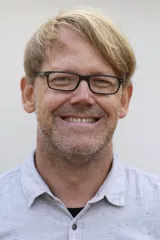Berlin/Huaraz (17 March, 2015). A person affected by climate change has made the unprecedented move to launch a claim against a European carbon major, demanding that the company contribute to urgently needed protective measures: Peruvian citizen Saúl Luciano Lliuya, with the help of the renowned environmental lawyer Dr. Roda Verheyen (Hamburg), demands payment for safety works from German utility RWE. Mr Luciano Lliuya’s property as well as large parts of his hometown Huaraz are prone to a so-called glacial lake outburst flood from Lake Palcacocha located upstream from the city. Germanwatch, a German environmental and development organisation, supports Mr Luciano Lliuya’s move against RWE upon his request. If the company’s response to his claim proves unsatisfactory, Mr Luciano Lliuya plans to sue RWE in a German court.
“This move is unparalleled in Europe”, says Christoph Bals, Policy Director of Germanwatch. “The fast-growing risks of glacial melting in this region clearly bear the signature of climate change. Saúl Luciano Lliuya is refusing to be merely a victim and is taking control of his own destiny“. According to a 2013 study, RWE is Europe’s single largest emitter of greenhouse gases. According to a 2014 report, the utility’s contribution to total global emissions since industrialisation is about half a percent. Accordingly, Saúl Luciano Lliuya demands that RWE covers 0.5 percent of the costs associated with the implementation of protective measures for Huaraz.
Glacial lake outburst flood threatens the city of Huaraz / IPCC: glacial melting in the Andes is caused by climate change
The Intergovernmental Panel on Climate Change IPCC finds that glacial retreat and melting of the tropical Andean glaciers is attributed to climate change. Glacial lake outburst floods are a growing threat in Huaraz, a small town of fifty-five thousand people, at the foot of the Peruvian Andes. Over a six-year span, a glacial lake located upstream has grown four-fold due to glacial melting. The increase in global temperatures is also associated with glacial pockets breaking, which may cause the lake to overflow. A resulting flood could quickly assume disastrous proportions and cause devastating damage in populated areas. In 1941, thousands fell victim to a flood when an earthquake caused chunks of ice to collapse into this lake – at that time the lake was much smaller than it is today. Since then the risk has dramatically increased, due to climate change. The latest flood was recorded in 2003. Authorities say that there is an acute risk of flooding; they have repeatedly declared a state of emergency. At present, there is no early warning system running, not even a provisional one, which recently stopped working.
To effectively avert the risk of flooding, glacial lake Palcacocha would need to be drained until further safety works can be implemented, such as building new dams and modernising the existing ones. For the purpose of undertaking these measures, Saúl Luciano Lliuya asks the utility to contribute around 20.000 Euro – this amount accounts for around 0.5 percent of the projected total costs and is equivalent to RWE’s share in global historic emissions.
Christoph Bals: “We support this claim. Those who harm others have to be held accountable for their actions. Thus, Germanwatch expects RWE to develop and implement a new business model so as to avoid causing further damages. In addition, the company has to pay its fair share of financing measures to protect those at risk. If the ‘polluter pays’ principle is not implemented in a market economy, profits are privatised while risks are socialised. Companies that create risks or cause damage to others through their business activity have to shoulder their responsibility and act accordingly.” It should not be a permanent solution that those affected by climate change, often the poorest and most deprived, have to pursue their individual claims for protection and enforce them against the polluters. “There is an increasing number of people whose very existence is threatened by climate change even though they have not contributed to it. We need a political solution to end this scandal, one that obliges the polluters to take responsibility. In the run-up to the Paris climate summit, a new climate agreement could bring new momentum towards this direction”, says Christoph Bals.
About Germanwatch
Germanwatch, based in Bonn and Berlin (Germany), is an independent non-profit organisation engaged for sustainable global development. Finding ways how the most vulnerable people worldwide will be able to deal with the consequences of climate change is one major focus of the organisation's work. In 2004 Germanwatch drew attention to the risks of Glacial Lake Outburst Floods for the first time. The publication, based on scientific publications, was internationally noted.


